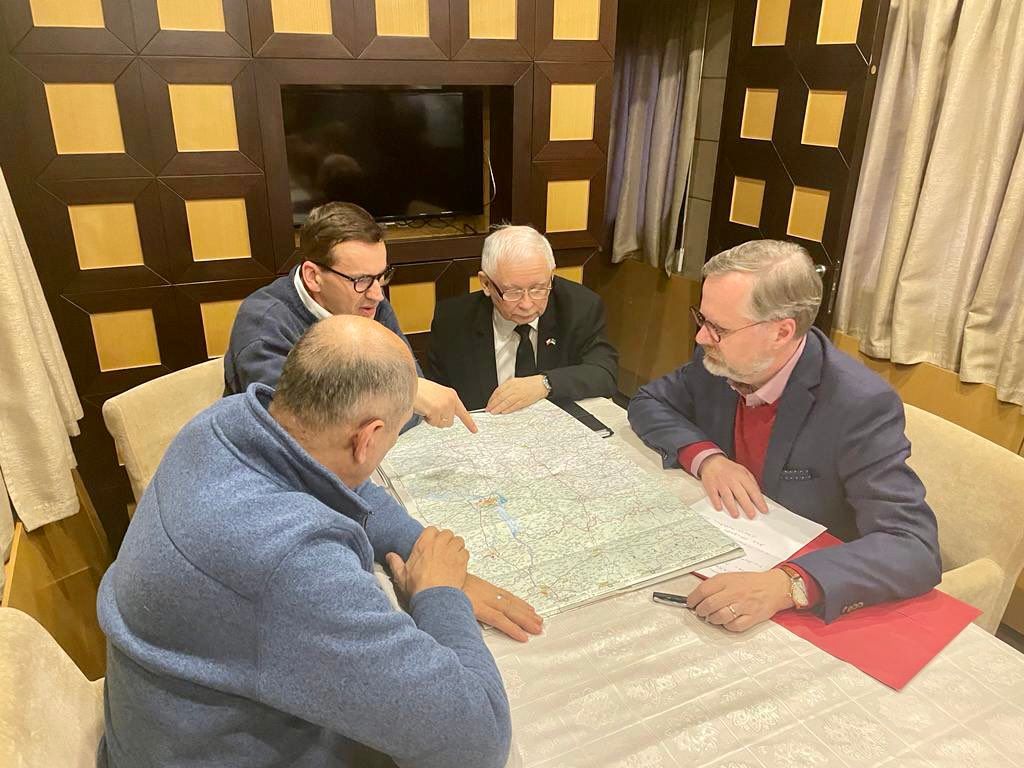Media around the world and journalists on social networks commented on the trip of the prime ministers of the Czech Republic, Poland and Slovenia to Ukraine, wanting to express their support for the politician. While European media often refer to the three countries in the headlines, North American dailies collectively refer to them as “Europe’s leaders.” Most texts praise the initiative, but some criticize the dangers of the road
The British daily reported the trip very similarly, only the order of the country names changed. The Guardian wrote “Poland, Czech, Slovenia”, in the subtitles they already act as “three EU leaders”.
The BBC’s correspondent Rob Cameron has suspended transportation options. Politicians have opted for the train, the journey from Poland to Kiev usually takes seven hours. According to Cameron, “disbelief” arose after the announcement that the trip would be made by train. He also drew attention to the differences in the views of the Prime Minister and Brussels on the road that arose “from the language used”, he wrote in Indonesia.
“EU leaders are flocking to Kiev,” Bloomberg said. In the text, the three authors state that they are the “leaders of Eastern Europe”, describing the road as a “dramatic intervention”. “The delegation consisted of representatives of several countries on the front lines, where most of the people who fled the war headed. Poland alone received about 1.8 million refugees. All of them are members of NATO and are one of the most vocal supporters of Ukraine’s accession to the EU. , ” he wrote. Bloomberg.
Together with Polish Prime Minister Mateusz Morawiecki, Deputy Prime Minister Jarosław Kaczyński and Slovenian Prime Minister Janez Janša, we will go to Kiev today as representatives of the Council of Europe to meet with President Zelensk and Prime Minister Shmyhal.
– Petr Fiala (@P_Fiala) March 15, 2022
NATO membership and strong support for Ukraine’s accession to the EU are also noted by the Qatari station Al Jazeera.
According to British newspapers Standard is “the reception of foreign dignitaries in his own capital is a great symbolic achievement of (Ukrainian President Volodymyr) Zelensk”.
“Three European leaders are heading to Kiev for the ongoing offensive,” wrote The New York Times. “Three prime ministers of the European Union,” wrote The Washington Post. CNN is simply stating facts and citing participants.
Dave Keating, Brussels-based correspondent for France 24, drew attention to the negative reaction from some EU politicians. According to them, the trip could “spark a Third World War”. According to EU officials and diplomats who spoke to Keating, the trip was not coordinated with the Allies and, surprisingly, announced ahead of time, posed a security risk. According to an unnamed EU official, the trip was a “private initiative”. In one of his tweets, the journalist raised the question of whether killing a member of a NATO member state in a war zone would be a reason to launch the fifth article of the Alliance’s collective defense treaty. This means an obligation for the alliance to defend its members.
“A bold display of European solidarity,” Ian Pannell, a foreign correspondent for America’s ABC station, wrote of the visit. Praise is followed in parentheses by “some”.
BBC editor Lewis Goodall in his work tweet highlight two “striking” states. Firstly, politicians travel by train to pared areas, and secondly, the EU is represented by the leaders of two countries that were once members of the Eastern bloc. “This embodies the disturbing shift of (Russian President Vladimir) Putin and stands behind the war.”
The fact that these leaders were going to Kyiv (by train) when the city was bombed is surprising. Perhaps even more surprising is that two former members of the eastern bloc will speak on behalf of the EU. It embodied the shift that so stifled Putin and was a major backdrop to the war.
– Lewis Goodall (@lewis_goodall) March 15, 2022

“Certified bacon geek. Evil social media fanatic. Music practitioner. Communicator.”







